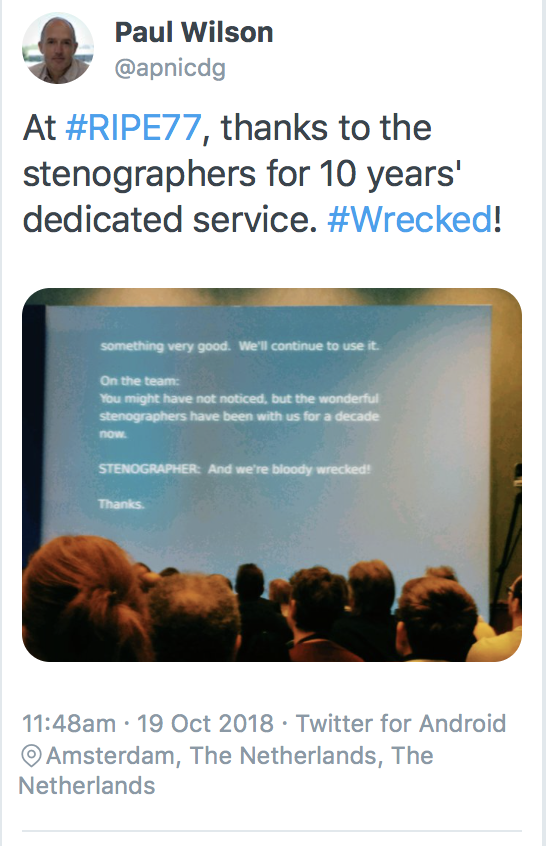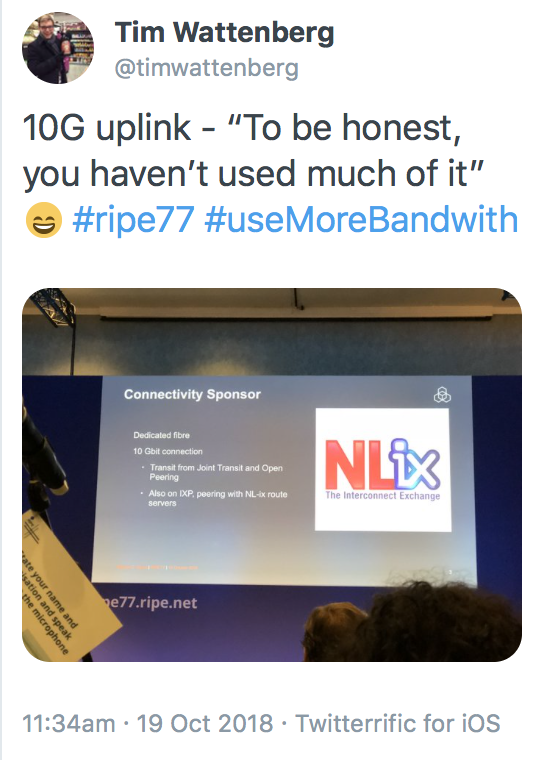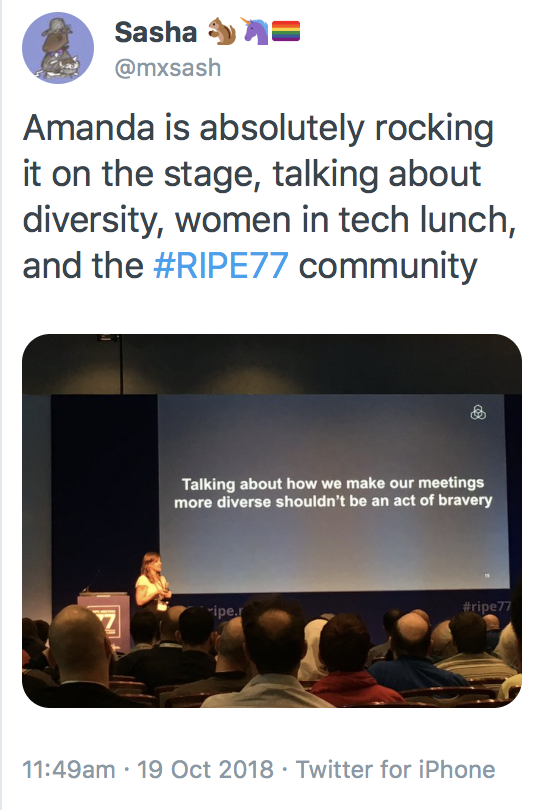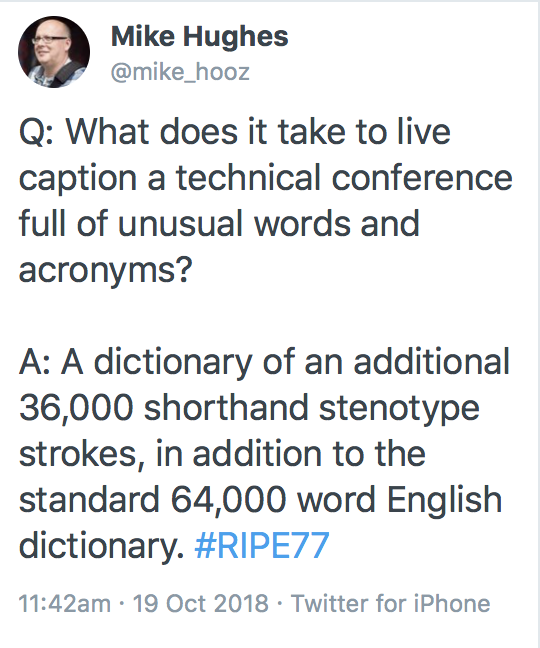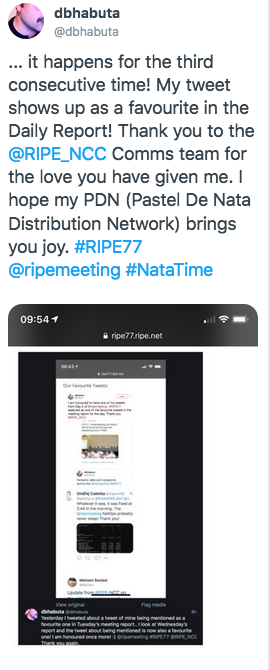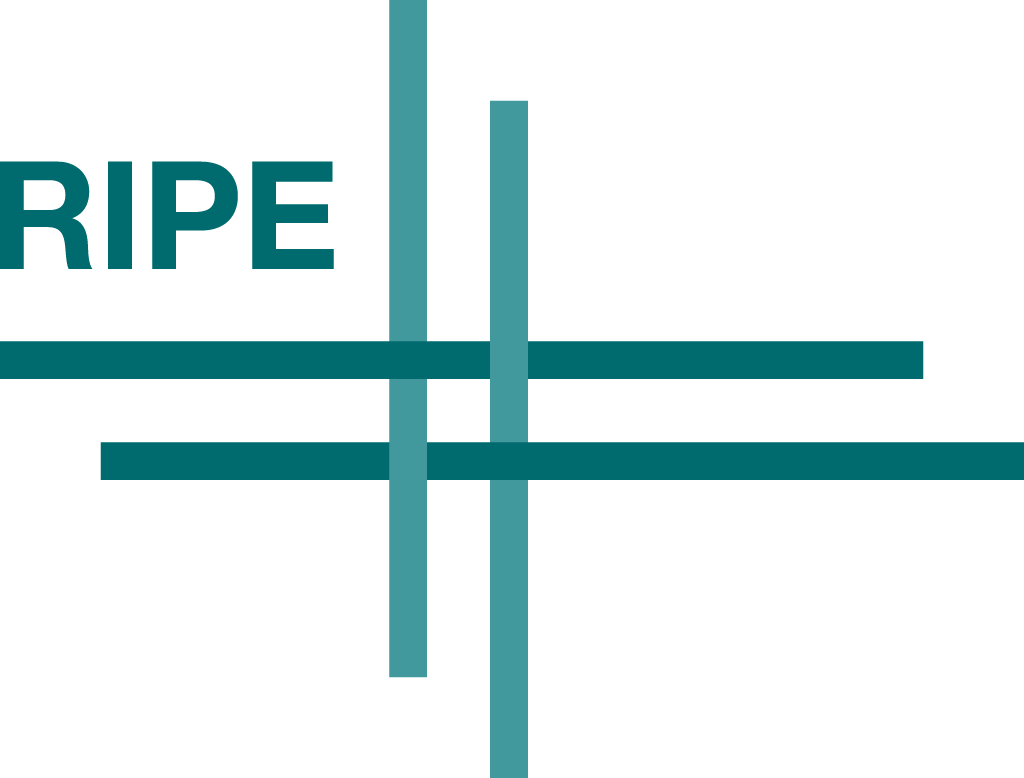- Monday, 15 October
- Tuesday, 16 October
- Wednesday, 17 October
- Thursday, 18 October
- Friday, 19 October
Monday, 15 October
Welcome to Amsterdam – home to canals, cheese, cyclists, “coffee”, and everyone’s favourite Network Coordination Centre. With some unseasonably warm October weather, the first day of RIPE 77 ended with 815 attendees registered and 660 checked-in. Some impressive numbers so far, but will it be enough make this the biggest RIPE Meeting yet? Follow this these daily meeting reports to find out!
Highlights from Monday’s programme:
- Tutorials on IPv6 (Jordi Palet Martinez, The IPv6 Company), P4 (Aaron A. Glenn) and updating the RIPE Database (Alvaro Vives, RIPE NCC).
- A newcomers introduction session that included a quiz and an ice-breaker – a great start for first-time attendees.
- A welcome from Hans Petter Holen, RIPE Chair and Axel Pawlik, RIPE NCC Managing Director – while Benno Overeinder, RIPE Programme Committee (PC) Chair invited everyone to get involved in the PC elections at this RIPE Meeting.
- Thomas Weible, Flexoptix, presented on “400G – Don’t Get Confused with this Transceiver Generation“.
- “It’s DNS Jim, But Not as We Know It” (we love the title!) by Sara Dickinson, Sinodun IT.
- The plenary concluded with Steinthor Bjarnason from Arbor Networks presenting the latest DDoS attack trends (carpet bomb and memcached reflection attacks)and Giovane Moura from SIDN Labs/TU Delft on DDoS attacks that target the DNS.
- The session concluded with lightning talks on Zombie Routes, Tracing Cross Border Web Tracking and HPIMP: Measuring Booter Services.
- The day finished with the BoF of the BCOP Task Force.
Our favourite tweets:
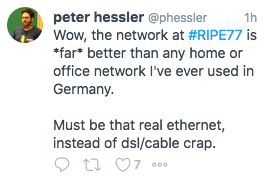
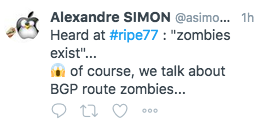
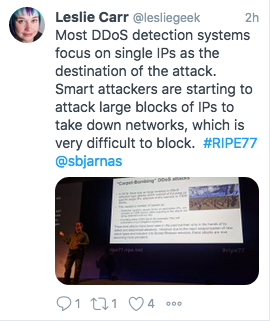
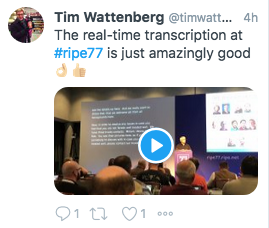
Tuesday, 16 October
Day 2 of RIPE 77 is done and dusted. It was another beautiful, warm sunny day in Amsterdam (not that many of us saw much of it!) and by the end of the day, we welcomed 714 attendees (including 203 newcomers). The meeting programme featured a full-day of plenary presentations.
Highlights from Tuesday’s programme:
- Henrik Kramshoej kicked off the Tuesday morning Plenary session with an engaging talk on VXLAN Security or Injection.
- Attilla de Groot discussed EVPN to the Host and then Flemming Heino spoke about Deploying a Disaggregated Network Model using EVPN Technology at LINX.
- Lorenzo Cogott on BGP Communities: Even more Worms in the Routing Can, Florian Streibelt on Routing Attacks in Bitcoin by Maria Apostolaki and Daniel Karrenberg’s homage to Jon Postel on the 20th anniversary of his passing (if you knew Jon personally, see Daniel to wear a sticker in his memory).
- An amazing Women in Tech Lunch with every seat filled, 90 minutes of engaging interaction with the audience and expert panel on “Quotas – Harmful or Helpful?” and “Male Allies – Why We Need Them, How to Find Them”.
- Constanze Dietrich spoke about the human factors of security misconfigurations, including the results of a comprehensive survey.
- Niels ten Oever presented about innovation and human rights in the Internet architecture, asking whether the governance model of self-regulation in the Internet architecture has led to the production of an environment that supports innovations and protects human rights.
- William Sylvester presented the RIPE Accountability Task Force Report, including recommendations to the RIPE Chair.
- Katherine Jarmul, Andreas Dewes and Andreas Lehrer dove deep into how machine learning can help solve networking problems, including security and traffic classification.
- Tom Strickx talked about using open source tools to make changes in a global anycast infrastructure.
- Lightning talks on the RIPE NCC Quantum Internet Hackathon, 8 Ways Engineers Use Snabb and the Sunset of VXLAN
The day concluded with an interesting BoF discussion on how the RIPE Meetings are evolving and what future RIPE Meetings should look like, the Newcomers’ Reception and the first off-site social at ESCAPE.
Our favourite tweets:
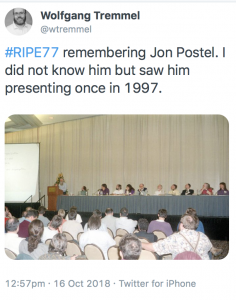
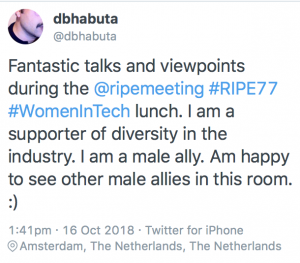
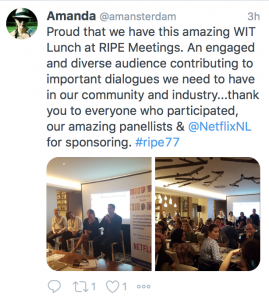
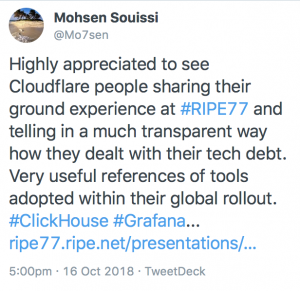
Wednesday, 17 October
Wednesdays are when RIPE Meetings shift gear and the working groups kick into action. Those of us who went overboard at last night’s social at Escape were probably not enjoying the 9 am start but no matter – the show must go on! It was a packed day both in terms of the agenda and attendees – with 760 people checked-in and 828 registered by day’s end – making this the biggest RIPE Meeting so-far.
Here are some highlights from today:
DNS WG
- DNS OARC Update from Kieth Mitchell.
- The Internet didn’t break with the KSK rollover – Edward Lewis gave a behind-the-scenes recap from ICANN’s perspective, while Petr Špaček highlighted a tool to test whether your website’s DNS might break instead in 2019 due to non-compliant DNS standards.
Address Policy I
- As the RIPE NCC approaches full IPv4 exhaustion, Andrea Cima presented some thoughts and ideas to the working group. Should we add more address space to the pool reserved for IXPs? What about the tiny pieces of returned IPv4 address space – ranging from /25 to /29? And what to do with address space that is returned to the RIPE NCC after runout?
Connect WG
- There was a presentation on discovering remote peers at IXPs: remote peering is a significantly common practice in all the IXPs studied and for the largest IXPs, remote peers account for 40% of their member base. Research also shows that today IXP growth is mainly driven by remote peering, which contributes two times more than local peering.
- DE-CIX announced that in January 2019 they will be blocking their old IPv4 space.
- There was a discussion about how the WG could improve, perhaps by making anonymous contributions possible or finding presenters from different regions.
Address Policy II
- In the second session, Ingrid Wijte from the RIPE NCC also opened a can of worms by asking what should be done with the country information in the RIPE Database and the delegated stats file.
- Jordi Palet Martinez then presented on his updated attempt to get clarification on IPv6 sub-assignments. This has been a long process – and it seems that there is still not agreement in the WG about how to properly frame the problem.
Routing I
- A proposal from Job Snijders, Martin Levy and Erik Bais on how to clean up RIPE-NONAUTH data using RPKI was hotly debated and will spill into the WG’s second session on Thursday. Marco Schmidt, RIPE NCC, reminded everyone to state their opinions on the Routing WG Mailing List so they can be officially considered in the PDP.
MAT
- Tim Wattenberg, University of Düsseldorf presented on Measuring Global DNS Propagation Times
- Trinh Viet Doan, Technical University Munich, showed how to trace a path to YouTube
- Robert Kisteleki gave an update on the RIPE NCC’s tools
RIPE NCC Services WG
- The usual gamut of updates from the RIPE NCC, including a general RIPE NCC Update, RIPE NCC Operational Update, and details on the RIPE NCC’s new credentialing activity, which allows operators to get recognised for their skills.
- There was a long and robust discussion on the recent proposal from Europol to add legal company data to the RIPE Database – and it appears much more discussion will be needed on the mailing list.
As is the custom on Wednesdays, the day ended with everyone unceremoniously ejected from the main room shortly after the close of the RIPE NCC Services Working Group – so that members could be allowed back in ceremoniously for the RIPE NCC General Meeting.
Our Favourite Tweets:
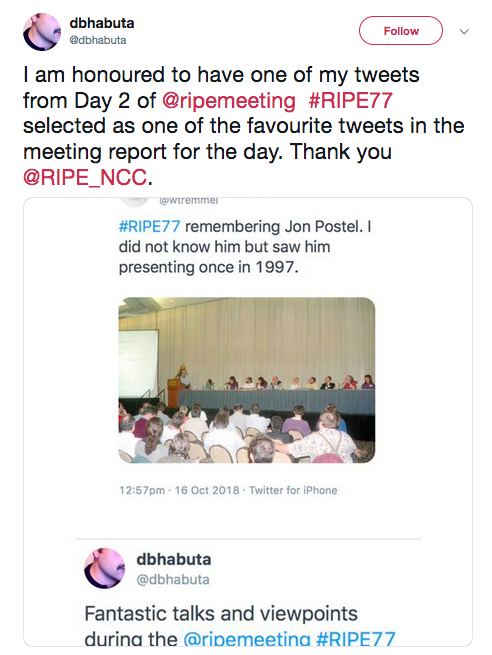
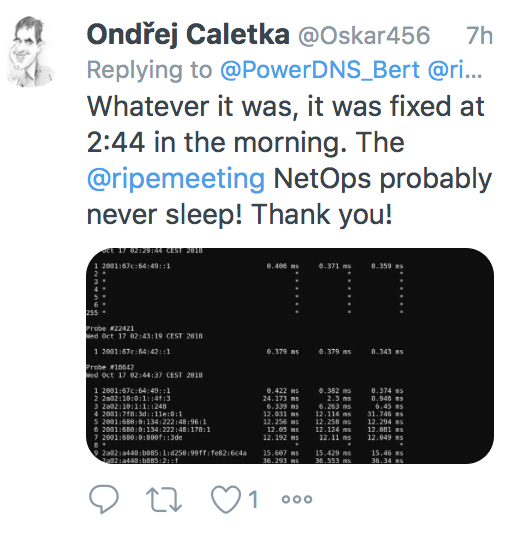
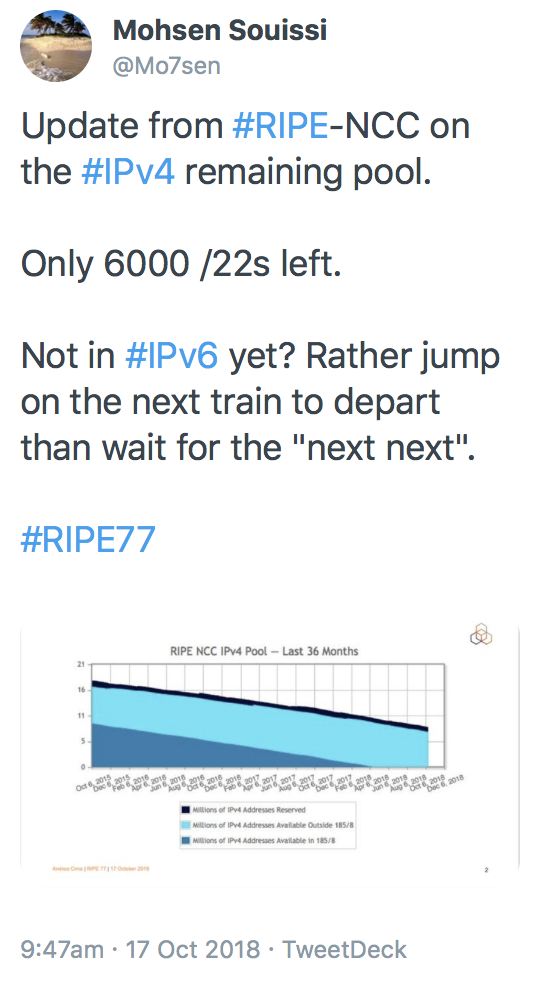
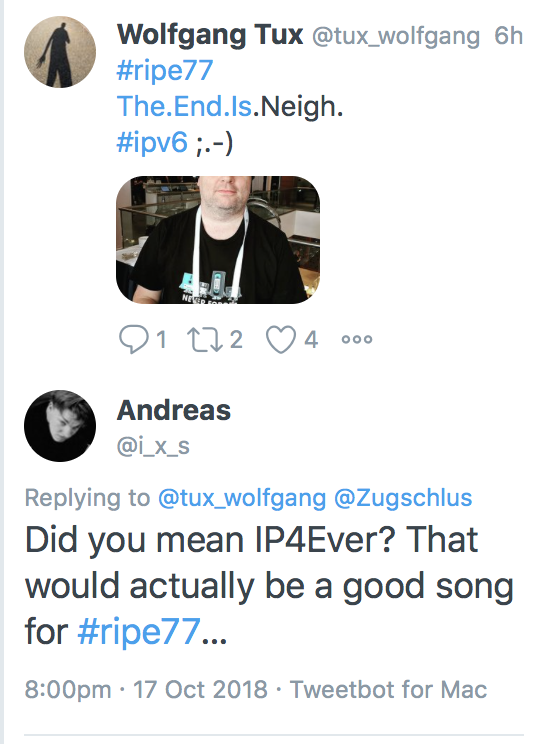
Thursday, 18 October
Thursday at RIPE 77 kicked off bright and early with eight Working Group sessions lined up on the agenda, some raring to get started, others due to pick up where they had left off earlier in the week. Once again, the number of attendees exceeded anything we’ve seen at previous RIPE Meetings with 790 checked in altogether (225 newcomers).
Here are some highlights from today:
Routing II
- In the first of two talks scheduled for the sessions, Alexander Azimov told us all about ASPA, a simple, scalable method for improving routing security
- We also heard from Florian Hibler who took to the podium to make a case for segment routing
- The session ended with a return to the matter of NON-AUTH objects that dominated a somewhat heated round of questions in the first Routing WG session the day before. Alexander Azimov presented some useful data points he’d gathered on the issue since then, much to the appreciation of the room.
Cooperation
- Chris Buckridge of the RIPE NCC presented on the ITU Plenipotentiary – and received a general sigh of relief from the room that RIPE NCC will be present to provide technical advice.
- Julf Helsingius gets two prizes – first for the most acronyms in a presentation title for giving a talk titled ‘Update on the ICANN EPDP on WHOIS/GDPR’ and the second for sharing a fantastic quote summarising the entire process he spoke about: “We went all the way down the deep, dark rabbit hole, and what we found was not cute fluffy bunnies, but rabbit shit!” ~ Beth Bacon. The only thing we know, he declared, is that the end result will be GDPR compliant.
- Arnold van Rhijn, from the Ministry of Economic Affairs and Climate Policy, Netherlands, gave a presentation based on precisely one slide. EuroDIG will be in the Hague in May 2019.
- Other presentations in this session included cooperation between ETNO and RIPE, talk to Hervé Clement for more details, and Suzanne Taylor from the RIPE NCC shared how EU regulation affects the RIPE community.
IPv6
- WG Co-Chair Jen Linkova gave an update on the IPv6 work taking place in the IETF
- RACI attendee Oliver Gasser dove deep into IPv6 hitlists
- Jens Link stepped back up to give a short and sweet tongue-in-cheek presentation on why we don’t need IPv6
- Benedikt Stockebrand closed the session with a talk entitled “The Art of Running Out of IPv6 Addresses“
Anti-Abuse
- The start of the session saw consensus in practice with the re-election of WG chair Tobias Knecht and the election of a new third co-chair Alireza Vaziri.
- Angela Dall’Ara gave an update on the abuse-c implementation of the policy proposal and by and large people are curious to see how it’s all going to work in the coming months.
- To police or not to police – and that’s not talking about a playlist for a road trip. That was the key question with regard to out of region LIRs and offshore companies with unclear documentation. Carlo Friacas and Dhia Mahjoub both shared very interesting details in their presentations, ‘LIRs from Outside the RIPE NCC Service Region’ and ‘Criminal Abuse in RIPE IP Space’ respectively.
Database
- The session kicked off with an update on the RIPE NCC database looking into NWI-5 and work being done to deal with out of region objects
- Erik Bais, along with Martin Levy, stepped up to talk about cleaning up RIPE-NONAUTH.
- Next, Denis Walker asked why there are so many PERSON objects in the RIPE Database, why there are so very many such objects linked to organisations, and why some organisations have huge amounts of these objects. The RIPE Chair thanked Denis for bringing this to the attention of the WG and the RIPE NCC.
DNS II
- Anand Buddhdev of the RIPE NCC presented an update on switching to a new DNSSEC signer and the upcoming 100Gig site for K-root, while Petr Špaček explained GeoIP + DNSSEC in Knot DNS.
- Benno Overeinder is another strong contender for most acronyms in a presentation title. His talk ‘IETF DNSOP WG Update’ was well received, as was Sara Dickinson’s presentation, ‘Updated Measurements on DNS Privacy’.
Open Source
- A new, upcoming version of the IRRd software was presented, version 4. It is a complete rewrite of IRRd and includes a lot of features that make it very interesting for all network operators.
- It has been an exciting three years for CloudFlare and their network automation using Salt. Many features have been integrated using open source software and there are many more features in the pipeline.
- The Snabb open-source toolkit was presented. It offers network engineers tools for building fast, flexible network functions. Applications range from simple one-off diagnostics to border routers processing traffic for large networks.
- There were two lightning talks: the first about the latest OpenBSD release, which is now at 6.4. The second was the presentation of Routinator 3000, an RPKI Relying party software written in Rust.
IoT
- Security is still the biggest issue when talking about IoT devices. There was a great range of presentations, mostly related to consumer products and their security risks, from security experts from various areas: someone from the IETF homenet WG, two security people from the Dutch police, a security tester/hacker and a researcher. There was a good deal of active participation from the audience and a lot of potential for further collaboration.
- Consensus on the IoT WG chair selection process was sought after an active discussion on the mailing list.
The day ended with a BoF aimed at discussing whether the time has come for a separate working group to deal with issues in data centre management. Then, last but not least, those who had been able to secure a ticket in time climbed aboard for a brief canal cruise over to Amsterdam’s Westerkerk for an evening of organ music at the RIPE Meeting Dinner.
Our Favourite Tweets:
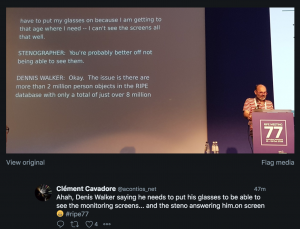
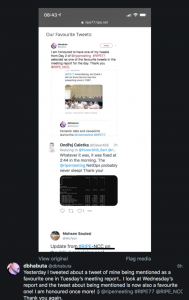
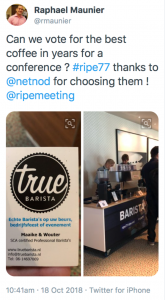
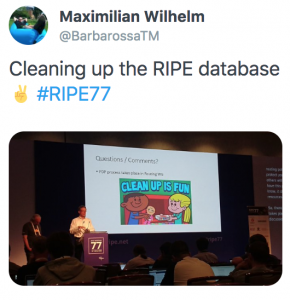
Friday, 18 October
The last day of the RIPE Meeting ended with 801 attendees checked in – and what a week it was! Some highlights from the day:
NRO/RIR Updates
- A panel of much-truncated updates from our colleagues at the other RIRs – this time we just got the highlights.
- An update from the NRO EC, which is not to be confused with the ASO AC… or the NRO NC for that matter – although these are basically the same thing – though the NRO NC is the group of people chosen from the five RIR communities to perform the role of the ASO AC within the ICANN structure. Clear? Jim Reid helpfully offered an analogy – the NRO is like a plug that needs to fit into a certain type of socket (ASO) in order to hook into ICANN.
- Some interesting stats on Internet number resource distribution in the five RIR service regions.
- The first session ended with a discussion on the draft RIPE Chair Selection Procedure, that was recently circulated on the ripe-chair-discuss mailing list. A lot of the comments were about whether a Nominating Committee (NomCom) was the best way to select candidates, how the NomCom should be constituted, and what role (if any) WG Chairs should play in this process. Using the input from this session, (along with earlier mailing list comments), the proposal will be updated and shared again with the community The goal is now to reach consensus on a selection procedure at RIPE 78.
Closing Plenary
- Louis Poinsignon’s report on how Cloudflare is deploying RPKI at scale attracted a crowd at the microphones.
- Of course, the report from our Ops team on the RIPE Meeting network got a solid round of applause.
- Amanda Gowland from the RIPE NCC gave a great lightning talk on increasing the participation of women in the RIPE community that was very well received.
- Artyom Gavrichenkov presented on Wrong, wrong, WRONG! methods of DDoS mitigation.
Closing Remarks from the RIPE Chair
- Alireza Vaziri is the newest Anti-Abuse WG co-chair (bringing the total up to three)
- Alireza Vaziri was also elected to join the RIPE Programme Committee (PC), while Maria Isabel Gandia was elected for another term.
- Nurani Nimpuno was elected for a three year term on the NRO Number Council (NRO NC), starting on 1 January 2019.
Our Favourite Tweets
